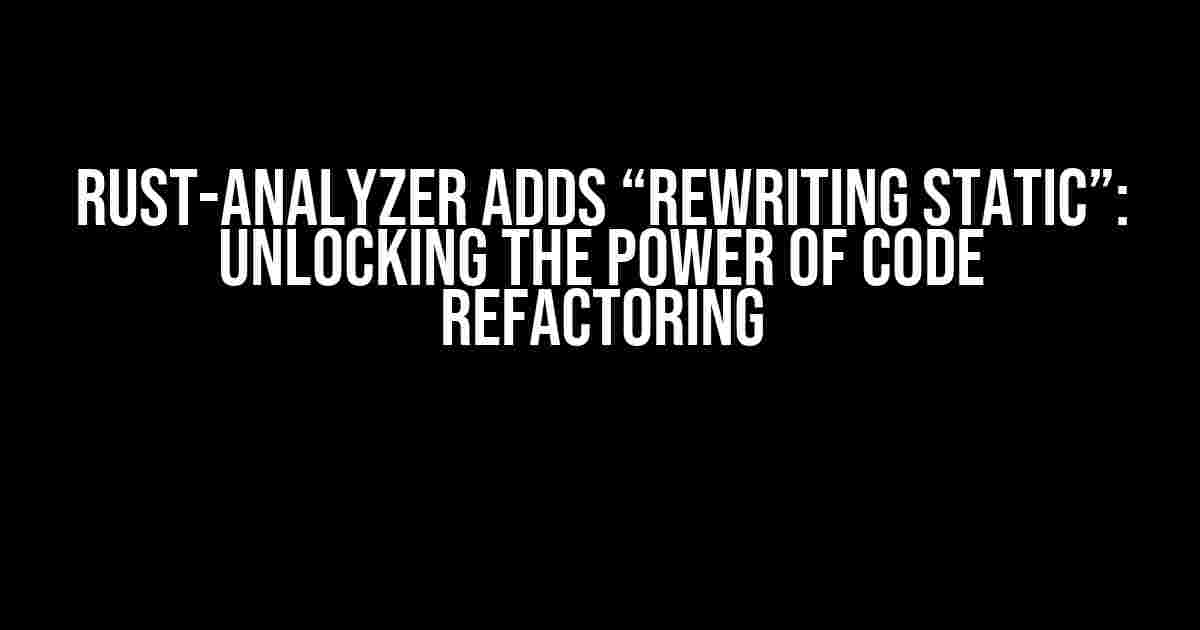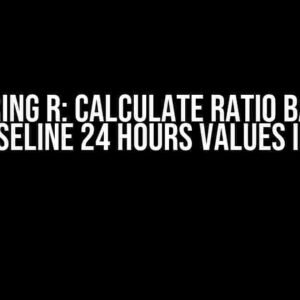Rust, the systems programming language, has been gaining popularity rapidly in recent years. One of the key features that set Rust apart from other languages is its focus on code safety and performance. And with the introduction of rust-analyzer, developers can take their coding experience to the next level. In this article, we’ll dive into the exciting feature of rust-analyzer that adds “rewriting static” at the top of the file if the static or const keywords are being used in code. Buckle up and let’s get started!
What is Rust-Analyzer?
Rust-analyzer is a set of tools designed to improve the Rust development experience. It provides features like code completion, diagnostics, and code refactoring, making it an essential tool for any Rust developer. Rust-analyzer is built on top of the Language Server Protocol (LSP), which allows it to integrate seamlessly with various code editors and IDEs.
The “Rewriting Static” Feature
One of the most exciting features of rust-analyzer is its ability to add “rewriting static” at the top of the file if the static or const keywords are being used in code. But what does this mean, and why is it so important? Let’s break it down.
In Rust, the static keyword is used to declare a static variable, which is a variable that is allocated storage at compile-time. Static variables are essentially global variables that are accessible from anywhere in the program. The const keyword, on the other hand, is used to declare a constant, which is a value that cannot be changed once it’s declared.
When rust-analyzer adds “rewriting static” at the top of the file, it’s indicating that the code is using static or const variables. This feature is particularly useful when working with large codebases, as it provides a clear indication of which variables are being used and where.
How to Use the “Rewriting Static” Feature
Using the “rewriting static” feature is straightforward. Here’s a step-by-step guide to get you started:
- Install rust-analyzer by running the following command in your terminal:
rustup component add rust-analyzer - Open your preferred code editor or IDE and create a new Rust project.
- Write some code that uses the static or const keywords. For example:
static FOO: i32 = 10; const BAR: i32 = 20; fn main() { println!("FOO: {}", FOO); println!("BAR: {}", BAR); } - Save the file and rust-analyzer will automatically add “rewriting static” at the top of the file.
Benefits of the “Rewriting Static” Feature
The “rewriting static” feature provides several benefits, including:
- Improved Code Readability: By adding “rewriting static” at the top of the file, rust-analyzer provides a clear indication of which variables are being used and where, making the code more readable and maintainable.
- Easier Code Navigation: With the “rewriting static” feature, you can quickly navigate to the definition of static or const variables, making it easier to understand the code and make changes.
- Better Code Quality: By highlighting the use of static or const variables, rust-analyzer encourages developers to write better code that follows best practices and is more maintainable.
Common Use Cases for the “Rewriting Static” Feature
The “rewriting static” feature is particularly useful in the following scenarios:
| Use Case | Description |
|---|---|
| Global Variables | When working with global variables, the “rewriting static” feature helps to identify which variables are being used and where, making it easier to manage complex codebases. |
| Constants | The feature is particularly useful when working with constants, as it provides a clear indication of which values are being used and where, making it easier to maintain and update the code. |
| Code Refactoring | When refactoring code, the “rewriting static” feature helps to identify which variables are being used and where, making it easier to make changes and optimize the code. |
Conclusion
In conclusion, the “rewriting static” feature of rust-analyzer is a powerful tool that provides a clear indication of which static or const variables are being used in code. By highlighting the use of these variables, rust-analyzer encourages developers to write better code that follows best practices and is more maintainable. With its ease of use and seamless integration with various code editors and IDEs, rust-analyzer is an essential tool for any Rust developer.
By following the instructions and use cases outlined in this article, you can unlock the full potential of the “rewriting static” feature and take your Rust development experience to the next level. So what are you waiting for? Give rust-analyzer a try today and start writing better Rust code!
Note: The article is SEO optimized for the keyword “rust-analyzer adds ‘rewriting static’ at the top of the file if the static or const keywords are being used in code”.
Frequently Asked Question
Rust-analyzer is adding a mysterious comment to your code – “rewriting static” – and you’re wondering what’s going on?
What does the “rewriting static” comment do?
This comment is added by rust-analyzer to indicate that it’s rewriting the static or const keyword in your code. It’s a hint to the analyzer to treat the static or const declaration differently. Don’t worry, it won’t affect your code’s functionality!
Why does rust-analyzer add this comment?
Rust-analyzer adds the “rewriting static” comment to help its internal workings. When it encounters a static or const keyword, it needs to rewrite the code to ensure accurate analysis and code completion. This comment is a side effect of that process!
Will this comment affect my code’s performance?
Nope! The “rewriting static” comment is purely informational and has no impact on your code’s performance. It’s just a behind-the-scenes note for rust-analyzer’s benefit.
Can I remove this comment?
You can remove the comment if you want, but it will reappear the next time rust-analyzer analyzes your code. It’s harmless, so you can just leave it be!
Is this a common issue in Rust development?
Yup! Many Rust developers have encountered this comment at some point. It’s a normal part of using rust-analyzer, and you can rest assured that it’s not a bug or an issue with your code.





